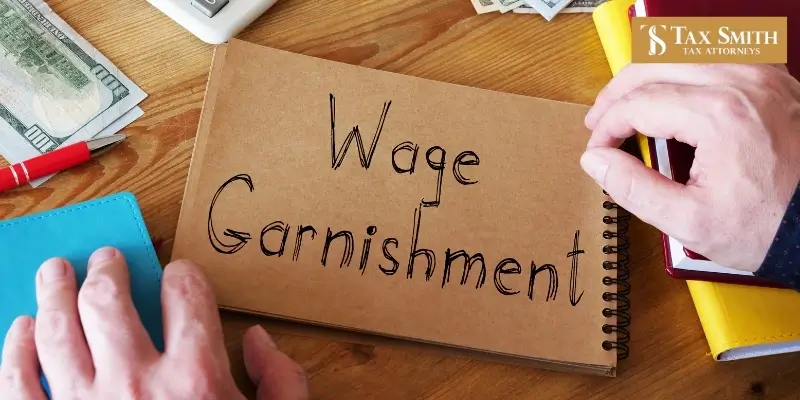1548 The Greens Way – Ste. 4 Jacksonville Beach FL 32250
Pensacola Wage Garnishment Lawyer
Pensacola Wage Garnishment Attorney
Wage garnishment can put you in a difficult financial situation, especially if you live paycheck to paycheck. It can make it difficult to pay bills and provide for your loved ones. When this garnishment comes from a state or federal tax agency, you need to work with a tax attorney. A Pensacola wage garnishment lawyer can review your situation and determine how to resolve the wage garnishment or take other actions to avoid a difficult financial situation.

When the Internal Revenue Service (IRS) is owed federal taxes, it can take several actions to collect those, although it will send notices of nonpayment first. Garnishment is one form of collection action, and the IRS may garnish your wages and take other collection actions, such as placing liens on your property. It is important to take action quickly when you are aware of your tax debt. Partnering with an experienced Pensacola tax debt settlement lawyer can make a significant difference in negotiating with the IRS, stopping collection actions, and protecting your financial well‑being.
TaxSmith, LLC: Addressing Wage Garnishment in Pensacola
The team at TaxSmith, LLC has decades of tax law experience throughout Florida. We help individuals, families, and businesses dealing with difficult financial situations that prevent them from paying back their tax debts. We understand how straining it is to deal with taxes and tax debt, and we take the time to help you financially recover. Our team listens to your situation and determines what options you have to resolve the issue.
There are methods to reduce your garnishment or negotiate other resolutions for your tax debt. Let our team help you find those solutions. You don’t have to deal with the IRS alone.
Understanding Wage Garnishment
If you have unpaid taxes, the amount only grows over time, thanks to penalties and interest. In 2024, the IRS collected more than $120 billion through unpaid assessments, along with returns that were filed with additional tax due.
The agency also takes more direct actions to collect taxes that were not paid. This includes wage garnishment. The IRS made nearly 314,000 requests from third parties to levy assets in FY 2024, including wage garnishment and other types of levies. Wage garnishment can be used to recover unpaid taxes by requiring your employer to take a portion of your paycheck out and send it directly to the IRS.
While other creditors have to request the ability to garnish wages from the court, the IRS doesn’t need this approval. They can garnish your wages or salary income and many other types of income, like bonuses and commissions. While there is a limit to how much the IRS can garnish, it can still be financially devastating.
Negotiation and Other Solutions for Wage Garnishment
The quickest way to prevent your wages from being garnished is to pay your tax debt. However, not all taxpayers can do this. The IRS is willing to enter negotiations with taxpayers, particularly when you cannot afford the amount of your tax debt. In FY 2024, the IRS helped over 62 million taxpayers.
You may be able to negotiate for a lower garnishment amount or another alternate payment method with the IRS. Other options to resolve wage garnishment include:
- Applying for an exemption. If you qualify as the head of your household, meaning you provide substantial support for a dependent, this can limit how much the IRS is allowed to garnish from your wages.
- Debt resolution. There are several methods of negotiating alternative payment methods with the IRS. This includes an installment agreement, an offer in compromise, and penalty abatement. An attorney can determine what options you qualify for.
- Filing for bankruptcy. You could end wage garnishment through specific methods of bankruptcy. This is an extreme option that should be considered with great care and legal support.
The Pensacola Taxpayer Assistance Center is located at 7180 N 9th Avenue. It’s important to talk with an attorney soon after reviewing a notice of nonpayment or notice of garnishment when you cannot afford your tax debt. An attorney can talk you through each of these options for resolution, allowing you to make crucial choices about your financial future.

FAQs About Pensacola, FL Wage Garnishment Law
How Much Does a Garnishment Attorney Cost?
The cost of a garnishment attorney will depend on numerous factors, and most garnishment attorneys will charge an hourly rate for their services. This rate varies depending on several factors, including the attorney’s experience, the specificity of the practice area, and the complexity of your unique case.
An attorney could save you significant money, however, by helping you address your tax debt and avoid further garnishment. Always discuss costs with an attorney up front.
How Do I Fight Wage Garnishment in Florida?
The most effective way to prevent wage garnishment in Florida is to pay off the debt for which the garnishment is for. If this is not an option, there may be other solutions. If your debt is with the IRS, the agency is frequently willing to negotiate. You could enter a payment plan, apply for penalty abatement, or secure an offer in compromise. If your creditor is exceeding the amount they can garnish, you can file a claim against them.
Can You Negotiate After Wage Garnishment?
If your wages are being garnished, you still may be able to negotiate the garnishment. Talk with a skilled tax attorney if the garnishment is for state or federal taxes. If you are not able to pay off the tax debt, an attorney can help determine what alternate payment methods you qualify for. You could negotiate a lower amount of debt to pay back or negotiate more time to pay it off.
Do I Need a Lawyer to Address Garnished Wages?
While it’s not required to work with a lawyer, you can benefit significantly by addressing garnished wages with an experienced lawyer. Wage garnishment can often be negotiated when you don’t have the funds to pay it. If your garnishment is happening due to tax debt, a tax debt attorney can review your options to repay the debt, such as a payment plan or an offer in compromise, mitigating the financial consequences of the debt.
Navigating Wage Garnishment and IRS Negotiations in Pensacola
IRS collection actions can cause significant financial hardship. If you are dealing with wage garnishment, liens, or levies, working with an attorney can help you find the most financially beneficial way to resolve them and address your tax debt. Don’t wait for the problem to get worse. Get in contact with TaxSmith, LLC today and see how we can help you address your debt in Pensacola.
Locations We Serve
- Alabama
- Arizona
- California
- Colorado
- Connecticut
- Delaware
- District of Columbia
- Florida – HQ
- Georgia
- Idaho
- Illinois
- Indiana
REQUEST A CONSULTATION
Please fill out the Contact Request Form and a Tax Attorney/Paralegal will call you
to discuss legal representation or to schedule your free initial consultation





